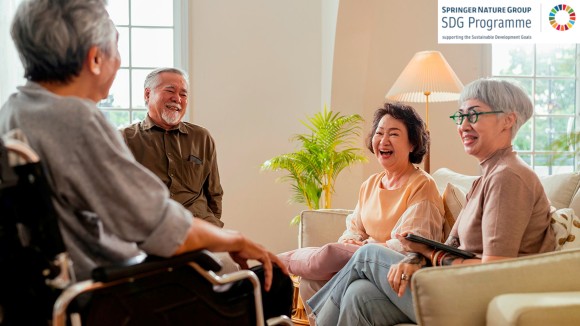Collection
Theorising and implementing smart healthy age-friendly environments
- Submission status
- Open
- Submission deadline
This Special Collection focuses on both theoretical and practical dimensions of the smart healthy age-friendly environments (SHAFE). The SHAFE concept is more and more widely discussed and used in the fields and interventions related to population ageing and intergenerational relationships around the world.
The SHAFE idea is one of the most recent iterations of the age-friendly cities and communities (AFCC) concept that was introduced by the World Health Organization in 2007. The discourse on the development of standards for adapting cities and communities to the needs of older adults and ageing societies initially focused on eight domains: housing, transportation, outdoor spaces and buildings, community support and health services, communication and information, social participation, respect, and social inclusion as well as civil participation and employment.
The SHAFE concept launched in 2018 by the Cáritas Diocesana de Coimbra, AFEdemy, and their Stakeholders Network is adding three additional layers to the AFCC in order to more dynamically take into account diverse needs and capacities of ageing societies, design accessible products, services and infrastructure to people of all ages as well as solutions related to the contemporary social, health, and environmental challenges. In the first layer, the SHAFE idea supports citizen development in terms of digital skills needed in using smart age-friendly solutions, understanding data processing and management, increasing health literacy, improving civil participation and engagement, as well as maintaining or improving their social networks and relationships. In the second layer, the SHAFE concept focuses on environmental-oriented solutions such as retrofitting and adapting the housing stock, fostering accessibility of public spaces and transport, implementing climate-neutral solutions, and promoting health and well-being in the workplace. Finally, the third layer of the SHAFE concept concentrates on health and care by promoting reliable, safe and accessible big data and artificial intelligence-based solutions, implementation of robust and interoperable digital infrastructures, fostering the development of integrated, personalised, affordable and person-centred solutions, implementing new guidelines and long-term funding solutions and business models as well as training care professionals on digital skills.
Goals of this Special Collection: (1) to discuss the theoretical basis of the SHAFE, including critical appraisal and review of this concept; (2) to identify and share the best practices and innovations related to the implementation of SHAFE; (3) to debate on governance modes, management solutions as well as evaluation and impact assessment tools relevant for SHAFE; (4) to gather knowledge and know-how regarding challenges in the areas of management, financing, designing, implementing, testing, and maintaining the sustainability of SHAFE-related products, services, and infrastructures; and (5) to recognise and analyse insights for the potential revisions and updates of the SHAFE concept.
Contributions are invited on key themes, including but not limited to:
- Smart healthy age-friendly environments in the context of ideas of public policy on ageing, such as active ageing, healthy ageing, ageing in place, and intergenerational policy.
- The dissemination and scaling up of the smart healthy age-friendly environments concept across the world.
- Comparison of the smart healthy age-friendly environments (SHAFE) idea with other iterations of the age-friendly cities and communities (AFCC) concept, such as Smart Age-Friendly Ecosystem (SAFE), Age-Friendly Smart Ecologies (CASE), Transgenerational Living Communities and Cities (TLCC), and Smart, Age-friendly Cities and Communities (SAFCC).
- The standardisation and normalisation of the smart healthy age-friendly environments-related products, services, and infrastructures.
- Empowerment of facilitators and citizen scientists in the fields of smart, healthy, and inclusive environments.
- Co-design, co-creation, and co-production in the domains of smart healthy age-friendly environments.
- Integrated services, funding solutions, business models, public policies, and programmes on the smart healthy age-friendly environments.
- Governance, public management, and organisational management-related issues.
- Opportunities, criticism, and ethical controversies related to digital social innovation, e-health, AI, and ICT solutions, social and service robotics, smart environments, gerontechnology, ambient assisted living, assistive technologies, telehealth, telecare, and welfare technology.
- The relationships of smart healthy age-friendly environments with concepts such as the silver economy, longevity economy, social and solidarity economy, circular economy, green economy, and sharing economy.
This Collection supports and amplifies research related to SDG 3 - Good Health & Wellbeing and SDG 11 - Sustainable Cities.

Editors
-
Agnieszka Cieśla, PhD.
Warsaw University of Technology, Department of Spatial Planning and Environmental Sciences, Warsaw, Poland
-
Delali A. Dovie, PhD.
University of Ghana, Centre for Ageing Studies, Legon, Accra, Ghana
-
Jorge Felix, PhD.
University of Sao Paulo, School of Arts, Sciences and Humanities, Sao Paulo, Brazil
-
Andrzej Klimczuk, PhD.
SGH Warsaw School of Economics, Department of Social Policy, Warsaw, Poland
-
Vitalii Nitsenko, PhD.
Ivano-Frankivsk National Technical Oil and Gas University, Institute of Economics and Management, Department of Entrepreneurship and Marketing, Ivano-Frankivsk, Ukraine
